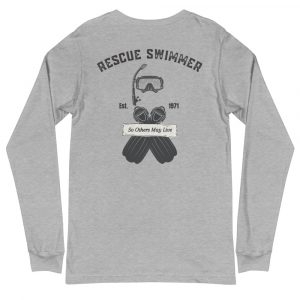Don't miss our flash to bang SALES!
Veteran of WWII and Bastogne, Henry Mooseker (PART 2)
Veteran of WWII and Bastogne, Henry Mooseker (PART 2)
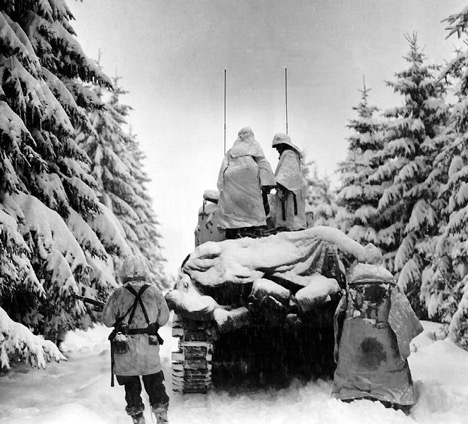
Answer: Yes.
Question: So well let me ask you that question ’cause here’s kind of the surreal aspect of war, war’s a weird thing.
Answer: Yes very weird, yes.
Question: So one day German’s your enemy, the next day ok they’re not your enemy anymore. Is that pretty much how it happened?
Answer: That’s right. Well not quite because there were, they’re still our enemy because we can’t quite swallow that these people profess that they weren’t really Nazi’s and weren’t, didn’t really know that Juggernaut existed, and they didn’t know, that’s all bullshit, they knew it. But I think the other thing is true that if they spoke out they’d get shot. I had a, well my parents were from Holland, and my brother, my father was one of 16 children. Now his favorite brother was a little couple years younger than he was. And he came to visit him and I can remember him visiting us when I was four years old, three years old, and he went back to Holland, and if he was anything like my father, my father was always quick to ah, say what he thought about anything he didn’t think was right or morale or yeah. But it got himself in a lot of trouble. But his brother was the same way and ah, he went back to Holland because he heard that somebody was squaring his girlfriend around and he didn’t want any part of that. But he stayed in Holland, he got married, had two children, a daughter and a son. And I know if he was anything like my father that ah, he didn’t like the Germans and he was probably either in the resistance or ah, it was politically, yeah, not wanted by the Germans. And one night in 1942 they broke down the door to his apartment in Amsterdam, the Gestapo did with armed guards and took him and his son away to a place called Noiengamen. Noiengamen was a prison for ah, political resistors and resistance groups and what ever. They usually shot the resistors. They lasted less than six months. We figure they shot them both. And um, I didn’t know this until after the war and I visited Holland, yeah. That’s another story but it’s ah…
Answer: You know and I don’t know whether our people realize that hatreds go much deeper than they think they do. They transcend generations in Europe and to think that something like Kosovo can be solved by sending some soldiers that are supposed to be policemen and nurse maids is ridiculous, it isn’t gonna solve it. We solved part of it but it isn’t gonna go away. And ah, again I feel soldiers ought to fight wars they shouldn’t be nurse maids or policemen or ah, like we tried doing in Somalia — where one whole platoon of our finest soldiers were killed for no good reason at all. You know, we’re not the world’s savior, we need to protect our own, selfish interests, ok. Because that’s what made this country great really. And it’s ah, it’s not trying to run the world that’s going to help us, I think it just gets us in a lot of trouble. It’s like trying to separate your neighbor in a fight, it doesn’t work. Keep your own nose clean, ok.
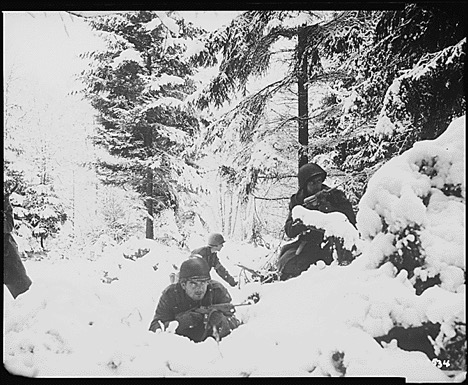
The Things Our Father’s Saw is other first hand accounts of the “war over there” and Rick Atkinson’s Pulitzer Prize books on WWII like the Guns Last Light (a three part series) are simply amazing. All four books are definite must reads in my opinion.
Answer: And there we were being trained to invade Japan. And it was, this was (inaudible) now, you gotta go back through the whole damn basic training, you gotta do it all over again, we’re gonna really make tough men out of you again, you know. We’re pretty beat up by that time (laughs). And I’m thinking, well my wife is gonna deliver a baby because you know, so I get, I get ah, furlough so I can see her and come back. They dropped that first bomb on, I think it was August 5th, I can’t remember exactly, 1945. And I’m thinking Lord, you did the right thing (laughs). And then, seven days later they dropped the one on Nagasaki and I said to myself this war is over, there’s nobody that can put up with this shit. Nobody can withstand it. And um, sure enough the Japanese surrendered and I was one of the first discharged because I had enough points with a wife and a baby and a purple heart and ah, battle stars and the whole bit. So I got home real early. And about, recently, about four, three years ago — for your information, I can’t remember the name of the act that permits the publication of previously secret information of our government, thirty years I think it is, or forty I can’t remember, maybe in the case of the Army it’s fifty — but anyhow this came out and I have the total of Army ah, what would you call, plans for the invasion of Japan. And for your information, for your information, in that group of papers is an indication of how they’re gonna supply the troupes that are gonna land, incidentally our 87th division was gonna land just south of Tokyo. And three other divisions, two to the north and another one to the south. But they minted seven hundred thousand purple hearts for, in, you know, preparation of the landing because they knew it was gonna be brutal. So that ah, I can’t understand any feeling of remorse about those bombs, I just can’t understand it. Because ah, you know, the information that came out after the war about the brutality of the Japanese is absolutely unbelievable. Um, recent book about the rape of Chun King, yeah, the, by the Chinese women, they literally raped thousands of women in Chun King. They ah, just killed thousands just for the hell of it. So ah, I’m glad they dropped the bomb, ok. So that’s ah, yeah.
Answer: So then being one of the earliest discharged I got my job back, I was yeah, but my main interest was raising my family. I didn’t join my division association until 1990 because I had other things to do. I had to bring up a family, I had to send my kids to school. And I liked my work. And ah, in reunions now, of our 87th division it’s really ah, how many men, they’re judges, they’re lawyers, they’re doctors, they’re ah, everything from plumber to you name what but they all went back, had a family, and went to work, yeah. Or went to school.
Question: Did you realize at the time that you were, well here’s a good example, right now all the last month they’ve been saying this is a part of history, this, this, this ah, Washington campaign, you’re a part of history…
Answer: Yeah, yeah.
Question: Did you realize while you were in World War II, that you were a part of history?
Answer: I think in a, you know, having been a college graduate I think I ah, realized that. I ah, I also thought one of the most amazing things to me during that period, I went through the depression and it was, it was real bad, and um, there were times that we didn’t have enough to eat. But be that as it may, there was never a period in our, as long as I, I’ve been living, where our country was so completely unified as during World War II. The ah, it was absolutely unbelievable. The ah, the farmers, yeah, everybody was working like umpteen hours a week, no, everybody was employed. But everybody just wanted to get this damn thing over just as soon as we could, yeah. And I, it’s ah, it’s hard to see the divisiveness that we see today when I can remember times like that. Because here we have the old against the young or the young against the old, the blacks against the white, the reds against the, yeah, no you name it we’ve got it. And it’s ridiculous. It’s absolutely ridiculous. And I think back ah, you know, when I was a boy, ah, the immigrants from Europe, they were pretty much segregated in groups — there was little Italy, there was Holland, there was Germans, there was — and we used to call each other names that we, you wouldn’t think of using today. We was almost done in jest and it was almost done in comradery rather than trying to hurt somebody. And it’s ah, sometimes you don’t understand why it’s so difficult to say ah, let me give you a litany of the names we used when I was a boy: it was dago, whap, kike, spic, squarehead, ah, yeah the Germans (laughs), never mind them (laughs), the kraut yeah. But it ah, yeah. It’s ah, surely not politically correct to use any of those phrases today. But it wasn’t unusual in that day and age, not at all. And it ah, you know, it was no skin off our noses either (laughs), it was when the fights started that, that was something different, yeah, anyhow, yeah.
Question: When you went to war, um, who were you, who were you going to war against? What were you personally fighting against? Who, a person, a country, what was it that…
Answer: It was, it was pretty much the Germans. They declared war on us yeah. And it was ah, yeah, you get ah. Oh, the other thing is the training you receive as a soldier. Makes you immune to a lot of the things that you are as a civilian, you know. One of the incidental trainings you get for instance in basic infantry training is to ah, visually see people wounded. They had actually characters that were dressed with open wounds and what not. They was pretty gory but they ah, this is all training really. It’s ah, no and the other thing, you don’t really want to be a hero, you know, hell no, that’s the last thing on your mind because you want to get the hell out of this. You know, now that you’re in it you want to get out of it just as fast as you can. And incidentally I think that we all sort of thought well if there’s some good way to get out of this we’re gonna get out of it, you know (laughs). This ain’t exactly ideal, this ain’t what we want to do, you know. But then on the other hand, once you’re committed um, Jesus there, it’s just an absolutely amazing what Americans can do when they want to.
Question: Did, did, was the war, your part of the war, and this is the hardest for me to understand, was it, did it become a hate?
Answer: Yes. No question about it.
Question: For a country or a person though, that’s the only thing I don’t understand is how you deal with, those are German soldiers, citizens, German country…
Answer: You hate them. You get to that point, there’s no question about it. You see your buddy or a friend or whatever, you know, it doesn’t take you long to hate, it doesn’t take long.
Question: Is that confusing? ‘Cause you talked about your family had some ah, German…
Answer: Yes, yes, yes. And I spoke German to the Germans, yeah. But that didn’t lessen my hate for them, no. It’s ah, yeah, you ah, yeah, you know they’re out to kill you so you want to kill them first. That’s what it is, simple as that.
Question: Can you make them not a person?
Answer: I think you do that, too, yeah. But they’re German, they’re ah, yeah.
Question: ‘Cause this story, you talked about coming up and finding that kraut sleeping in that foxhole there and taking his gun out and all of a sudden here it’s a one on one thing.
Answer: Yeah, yeah, it gets a little rough yeah (laughs). Yeah, you just don’t kill people indiscriminately no. Some, there are those in the service that would do that, ok? But there are not many, not many. Hell, there’s ah, sadists everywhere I guess. They’re not, thank God, there’ re not very many of ’em, you know. There’s another thing too, if you’ve been close to somebody and you think he was unfairly killed by, you know, like the guy who’s, yeah that’s different, you know, it’s ah one to one again. You just killed my buddy. You know, and ah, it gets so that ah, yeah shooting your weapon is ah, you don’t think about the other person, really, you don’t. You’re laying down fire period, you know, yeah, yeah.
Question: It’s either me or them.
Answer: Yeah right, simple as that.
Battle of the Bulge reads to learn more:
Question: I just, I can’t, I mean, I know if I were put in the situation then I would assume I could do that. It’s just so hard to conceive um, what has to go on in your mind to be able to.
Answer: Yeah, yeah.
Question: Because I assume once you got down with the war you had to be able to…
Answer: Oh yeah you just shut that off it’s ah, yeah.
Question: Put it away.
Answer: Yeah, yeah. In fact ah, during that battle on the Rhine, there was a mortar shell hit the lip of my foxhole and I was literally knocked unconscious but I wasn’t wounded, all right? The reason I wasn’t, I put some logs over the top and I had my head underneath the… And ah, for three years, maybe four, after I was back home, at work, with my wife and family, we would go to bed at night and every night for three years, just as I was falling asleep, that mortar shell would come into my foxhole and would explode and I’d just jump out of bed. And my wife would, you know, would scare the hell out of my wife. ‘Cause I heard this tremendous boom in my mind, you know. And it took three, three and a half years before that stopped. So there are memories, you know, that are seared into you that ah, difficult to get rid of.
Question: Did your wife understand?
Answer: Oh yeah, yeah.
Question: I mean, so there was enough conversation.
Answer: Oh yeah.
Question: ‘Cause I know a lot of some of the problem with different vets…
Answer: One of the unusual things about my wife was that her mother lived in Nebraska and she had been staying with my parents in New York City, Bronx really, 188th Street. But she wanted to see her mother and she was pregnant with, yeah. She went back to Nebraska and her mother said there’s something wrong, you’re not quite well. And my wife said yeah we better go, so they went to the hospital, and she learned that while she was carrying the baby whose Elaine, our youngest — the only girl we had, not the youngest, we have a younger son — but anyhow she had a ah, ovarian cyst and in the hospital she was in, the doctor said that if they had to operate because it was growing at a very rapid rate, but they could not save the child, that they would have to abort the child. My grandmother said ah, we ought to get another opinion. So they went to a Catholic hospital, and I’m a Protestant I’m not a Catholic and neither is my wife, but they went to this Catholic hospital and the doctors went through the same procedure and said we will try to save your baby, we’re not going to guarantee it, but we’ll do everything we can. So they operated on her, removed a cyst that was almost the size of the baby and she carried the baby to full term and she was born on September the 1st, 1945, yeah. Oh, while she was in the hospital a wounded infantryman, this is like during two-thirds of the Battle of the Bulge, all right, when I’m overseas, and I have all my letters I wrote home, and it’s a little bit like ah, well it’s not quite like a picnic but it ain’t all that bad honey, you know (laughs). And almost all the letters the soldiers wrote home were, were ah, you know, you better, they gotta keep these people at the home front up (laughs), you can’t let them feel bad. But anyhow she said this soldier came in and he asked about her and she said well my husband’s over and she, you know, what little she knew where I was and what not. This infantryman said um, you know, he said ah, well yeah, I know what’s it’s like. He had half his leg blown off, you know. And that, but he, it brought her spirits up. He said, you know, he’s gonna be alright, and what, but anyhow it was, you know. So ah, I’m sure that ah, every family had something like this going on at the time, yeah.
Question: That had to be tough.
Answer: It was very tough.
Question: Now did you just gotten married before you got in the service? Or had you been…
Answer: Remember I, when I got this order being discharged because they wanted me outside of the Army, that’s when I got married, yes.
Question: Was that in between?
Answer: In between, yes.
Question: So all the time you were over there you were a newlywed.
Answer: I ah, yes, and I had a family and a son at home. And ah, a baby on the way when I left. Incidentally (laughs), my wife was ah, I met her in Washington D.C. on a three day pass, all right. And ah, she’s a glorious red head and she had a pretty good job in Washington. And when I proposed to her she said, oh, I got out of the Army, I said we can get married I proposed to her in the railroad station in Washington D.C. And she said “Ok”, she said, “but I just got a new job.” I said “What’s that?” “I’m the secretary for ah, General” what the hell is that guy that flew over ah, Japan and dropped the bombs? “General Doolittle.” And I said “My God, that’s quite a job.” She said “Yeah it is.” I said “Well ah, you still want to get married?” “Yeah I want to get married.” So we did. My ah, my cousin, second cousin really ah, oh I’ve always very close to Yetta, my cousin, and him. He arranged for a, ah, service in Paterson, New Jersey and we got married, yeah, that was it.
Question: Wow.
Answer: Things were ah, you didn’t have any gas (laughs), it was a, was a hectic time that’s for sure. But the ah, oh the other I’ve got to mention this. On my way overseas, I met my wife, I said, “Lorraine, I’m gonna be in Washington, I got a three day pass.” And I don’t know what anybody knew (inaudible) in Washington D.C. was absolutely unbelievable. And I, and we got there, and I said “Let’s try to find a hotel.” We couldn’t find a hotel anywhere. She says “Let me call somebody.” Of course she had, she had knowing the general (laughs), and he got us in a very fine hotel (laughs). And I think that’s when Elaine was conceived and that was just before I went overseas.
Question: Wow
Question: And so while you were over there you were having correspondence with your wife.
Answer: Yes writing letters to her yeah.
Question: So you know now that you’re expecting, this would be number two?
Answer: Yeah, yeah.
Question: Boy I just again, to be in this country that’s not your country, fighting this war, and to have all this back at home. I guess, I would assume that gives you a little extra motivation to stay alive.
Answer: Yeah, yeah, yeah, (laughs). That’s right stay alive (laughs).
Question: And it ain’t gonna be me.
Answer: Yeah, yeah it ain’t gonna be me. And ah, when I was going overseas, they shipped us to ah, Fort Miles Standish, it’s out of Boston to put us on the boat to take us overseas. And the first command they gave us was, we’ve got this fence around the post and you are not to leave, you know, you’re absolutely not to leave. Here I’m in Boston, you know, right outside of Boston, in fact south of Boston and I know it’s right next to the railroad tracks and I know that the goddamn train runs from New York to Boston almost hourly back and forth. And I’m looking at that fence and I’m thinking that fence ain’t big enough (laughs). So they tell us, you know, that maybe they’re gonna shoot you or whatever. But I know my wife’s in New York and I’m in Boston and I’m sitting here waiting for a boat to go overseas. And ah, comes dark, ten o’clock, I go to that fence, climb that mother, and jump over the fence and run over to that station. I ain’t got any ticket, I don’t have any money, I get on, the train stops, I get on, I know it’s going to New York, I know the directions (laughs). I get on, on the train and I figure what the hell’s gonna happen. So the conductor comes, “Tickets please, tickets please” he comes to me he says, “Soldier, where’s your ticket?” I look at him, I says “Conductor I don’t have a ticket.” He said “You come with me.” I thought, Jesus, they’re gonna throw me off the next station. So he takes me into the dining car and he sits me down he says “Sit there soldier until you get, where do you want to get off at?” (laughs) So I tell him. He says “I’ll be sure to tell you where you get there” and he says “besides that” and he tells the guy in, on the diner he says “Give this soldier a drink.” (laughs) And that’s the kind of thing that was going on in this country at that time. It was a, yeah, I didn’t expect it. You know, but he did.
Question: That’s what I heard, the respect for the uniform, they knew what you were facing and what you were doing for the country.
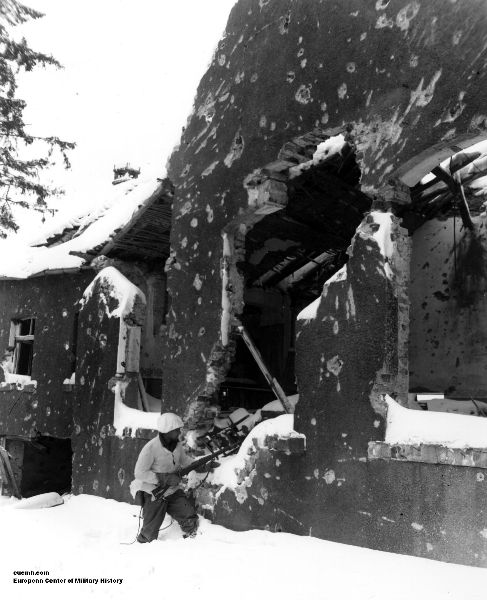
Question: Do you think that there, ah, or what do you think that your message from World War II to future generations, to great, great grandchildren that you’ve never met. What message that you think should be left with them?
Answer: Well I think morality of course is ah, and I feel that in many ways our society is, is ah, sliding a little bit to the immoral side. And I’m not ah, a goody two shoes by any stretch of the imagination, but what I see lately with the fracturing of the families that’s, that’s really serious and I think our country is gonna experience some real problems and is experiencing those problems because of fatherless children, really. And ah, it’s getting so marriage isn’t respected like it used to be. And that, I fear, is real bad for our country. And I think it’s also the basis of much of our ah, political problems, because of ah, somebody gets something for nothing, why can’t I? And it’s just going too far. It has gone too far.
Question: Do you think that ah, and I know this is real hypothetical because our technology has changed so much, but if we were to face another Pearl Harbor, do you think that America would unite the way that it did?
Answer: I guess it depends on who our enemy is or would be. And I think right now because of the total technological improvements that I sort of believe the wars like we saw it is almost impossible now. And I think the atomic weapons and defense against ’em is real important to this country. And I think we ought to have the wisdom to know that ah, we have our interests and we ought to protect them. And we ought to stay out of meddling in other people’s affairs, I really do. And I think ah, this seems to be almost a general consensus that a world government is the thing to come and to be but I think it’s a big mistake really. I think people can govern themselves if they learn how. And if they don’t know how they can suffer the consequences. It’s ah, and I fear for our country because of ah, this alienation that does exist within us. Like I said, in the beginning we used to call ourselves squareheads and dagos and whaps but there was no hurt in it. In ah, yeah, if a guy could do a job fine, let him do it. And that’s the way it ought to be really, period. And I think, I feel very strongly about equal opportunity and I think it’s the basis of our, our country. And I think we ought to enforce it in every way we can.
Question: What do you think that the worst aspect of war was?
Answer: It’s hard to say the worst aspect, you know it’s all bad. The wounded, the total destruction. You know, we had a pretty good ah, method of destroying, I know we can do a much better job now but ah, it was ah, absolutely unbelievable what you can do with artillery and whatever we did with what we did. Ah, I don’t think that people realized how starved and how weak and how totally lost the people within Europe, outside of France, and I’m talking generally Germany was full of ah, people they had captured and put to work. There were all kinds of displaced persons, it was absolutely unbelievable how you know, people from Poland were down in the southern part of Germany, the Dutchmen, I can remember halfway through Germany I’ve, you had these little compounds in every town the indentured or the slaves that were put in here, and they’d go to work in the town and do whatever there and they’d come back and work in this compound. We’d always bust them open first. And ah, along the way I got two Dutchmen and they were about 21 years old and I looked at them, I could speak Dutch, I said “What are you doing?” He said “We were working at this factory we had to, they put us here.” I said “Well what are you doing now?” He says “We’re going to Holland.” I said “Holland’s 300 miles away.” “I don’t care we’re going to Holland.” (laughs) And off they went. And I can remember another thing that really got me. Ah, towards the end of the war we had hot meals and we had mess line, all right. In the mess line you got your meal, you ate, and you, then you wash your mess gear. And had two cans, one was full of soap to wash it and one to rinse it. And the one that rinsed always had a skim of grease on the top of it. And this Russian was there with a crust of bread skimming the grease off the water in the rinse pan and eating it. And I thought my God you gotta be awful hungry to do that and that’s the way the people were. So I think starvation you know ah, hunger, disease, yeah, you can’t believe the lice on these people. It was absolutely unbelievable. Ah, hunger, starvation, yeah just wounds, it’s ah yeah, it’s just awful period.
Question: Is America a good country? I mean are you proud…
Answer: I’m proud to be an American, yeah. In fact I do a quite a bit of travelling, I travel, my wife and I travel extensively. Maybe 14, 15 weeks out of the year. And I think we’ve been in all the countries of Europe except Poland, Finland and Russi
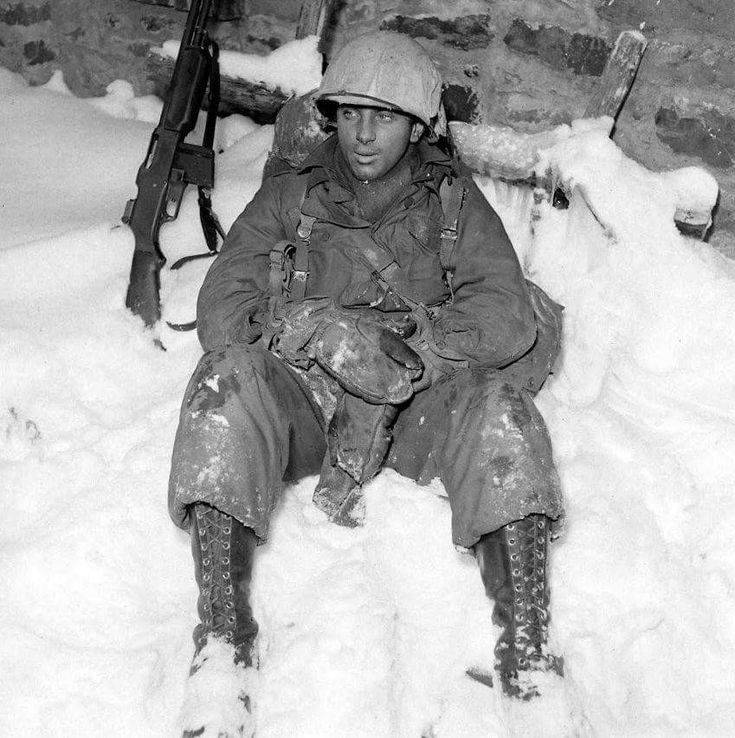
Question: When you see the flag go by in a parade or wherever it may be, how do you feel?
Answer: When I see what?
Question: The flag, our flag.
Answer: Well I feel very proud of it, and I ah, yeah I um. Yeah I stand at attention and put my heart over, yeah.
Question: Do you think that ah, that you’re a hero for what you did?
Answer: No, not particularly. There’s too many like me, that are wearing ah, they got a bunch of medals yeah. And they’re proud of them, yeah, they got ’em in a rack and there, and yeah, hang ’em on a wall, yeah. Sure I’m proud of that.
Question: Now do you have grandchildren?
Answer: Yes, I’ve got one great grandchild.
Question: Oh is that right?
Answer: Yeah, yeah.
Question: So do you ah, I mean, that’s one thing about our society right now, very short sighted. Now you get to look at, you know three generations…
Answer: Yes, is.
Question: …and to know what you fought for, I mean do you look at your great grandchild and think damn it I made this a better country for that child?
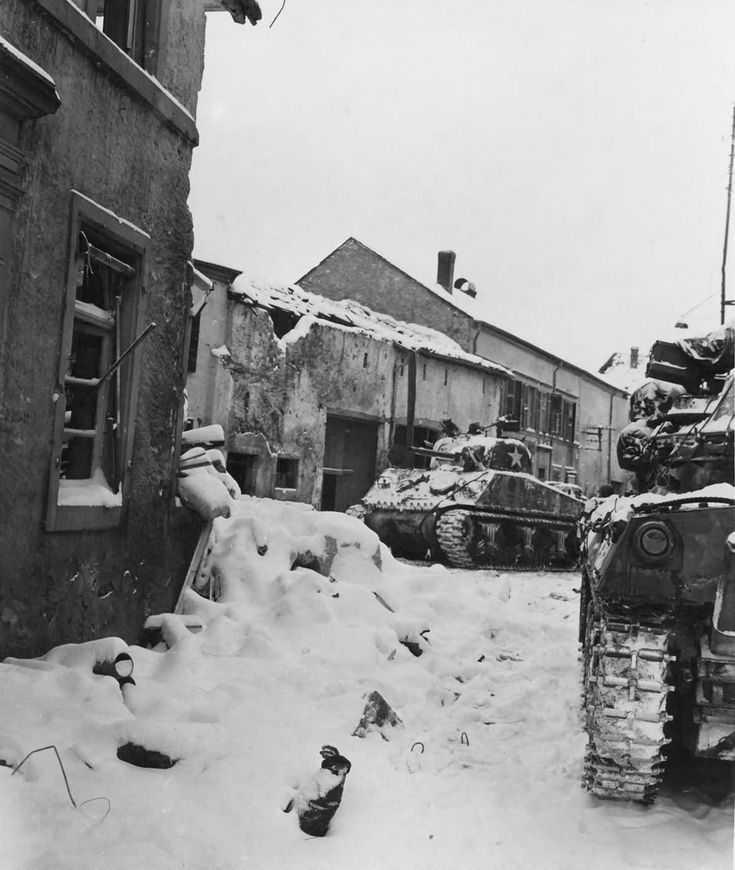
Question: That’s the big question is why.
Answer: And I think it’s people themselves, it isn’t the government. I think partially the government trying to do everything for a person is a big problem really.
Question: Well like you said, I mean you look globally and look locally and say it’s time for them to do something for themselves.
Answer: Yeah.
Question: We can’t be the peace keepers of the world and everything like that.
Answer: That’s very true.
Answer: Piper airplanes, ok, unarmed and they were forward artillery observers and these bastards would be flying about I’d say maybe 200 yards up and that’s about all. And they were, you know, flying over these lines and it’s a wonder all of ’em weren’t shot down. Many of ’em were but they, and how the hell did they have the guts to go up in that goddamned little plane and fly around.
Question: It’s almost like flying a little Cessna over…
Answer: Except it wouldn’t move very fast because they had to go look and see what the hell was down there. And that yeah, sheesh.
Question: And they were spotting troops.
Answer: Yeah spotting troops and calling the artillery in on, yeah. And that, gee, sheesh, they were there whenever it was clear, you know.
Question: Wow (laughs).
(Courtesy of WWII Voices in the Classroom, www.wwiihistoryclass.com)
The Things Our Father’s Saw is other first hand accounts of the “war over there” and Rick Atkinson’s Pulitzer Prize books on WWII like the Guns Last Light (a three part series) are simply amazing. All four books are definite must reads in my opinion.
The Frontlines uses referral links cover the web hosting, research and gathering of stories to preserve military history and humor. The items linked to are my personal favorites of stuff or things I have read over the years. Thank you for your support!
Popular Products
-
GRIT
$19.50 – $28.00Select options This product has multiple variants. The options may be chosen on the product page -
Navy Rescue Swimmers Est 1971
$33.50 – $36.00Select options This product has multiple variants. The options may be chosen on the product page -
SNAFU
$19.50 – $28.00Select options This product has multiple variants. The options may be chosen on the product page -
Warrant Officer (Mens Version)
$23.00 – $35.00Select options This product has multiple variants. The options may be chosen on the product page


